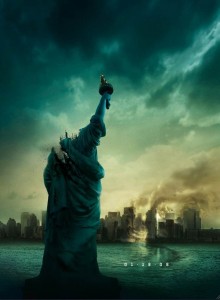 Fears, and perhaps for some, joyful anticipation, of apocalyptic doom is in the air. This is perhaps most evident with Christian radio and television preacher Harold Camping’s prediction of the end of the world on May 21st. But this is nothing new, and science fiction and horror films have often involved depictions of apocalypse. But in an article in the new edition of The Journal of Religion and Popular Culture, John Walliss and James Aston argue that cinematic depictions of apocalyptic have taken a more pessimistic turn in our post-9/11 world. 9/11 was such a dramatic shock to the national psyche, it should come as no surprise that it should inform depictions of the apocalypse in film.
Fears, and perhaps for some, joyful anticipation, of apocalyptic doom is in the air. This is perhaps most evident with Christian radio and television preacher Harold Camping’s prediction of the end of the world on May 21st. But this is nothing new, and science fiction and horror films have often involved depictions of apocalypse. But in an article in the new edition of The Journal of Religion and Popular Culture, John Walliss and James Aston argue that cinematic depictions of apocalyptic have taken a more pessimistic turn in our post-9/11 world. 9/11 was such a dramatic shock to the national psyche, it should come as no surprise that it should inform depictions of the apocalypse in film.
In “Doomsday America: The Pessimistic Turn of Post-9/11 Apocalyptic Cinema,” Walliss and Aston contrast the type of apocalyptic films produced in the late 1990s with those that took place post-9/11. Although they recognize that apocalyptic cinema runs across a spectrum, and that post-9/11 apocalyptic cinema should not be construed as a separate cycle, nevertheless they rightly recognize the distinctive turn in the post-9/11 expressions. In their view, there are both continuities and discontinuities in apocalyptic films both pre- and post-9/11.
There are two interesting aspect of their discussion worth drawing attention to. First, they rightly note that there has been a desacralization of the apocalypse. Taking their cue from Conrad Ostwalt, they note a shift from religiously-based expressions of apocalyptic brought as a result of divine judgment, to more natural forms of the end of the world. Often terrorism is looming metaphorically behind these “natural” rather than supernatural expressions of apocalypse, as exemplified in films like Cloverfield, and War of the Worlds (2005).
Beyond the desacralization of the apocalypse, Walliss and Aston also note that many of the post-9/11 cycle of apocalyptic films raise the question of whether human beings can and should be saved. The authors share an example of this in the conclusion of Diary of the Dead where voice-over narration asks “are we worth saving?” Many of these films frame the apocalyptic narrative in such a way that the real threat comes not from the forces or agents of apocalyptic judgment, but from human on human violence which comes as a result of the apocalyptic environment and the breakdown of the social order. It is no wonder then that many filmmakers, and perhaps the audiences that watch their films, would answer this question with increasing pessimism, and often with a resounding “no.”
At the conclusion of this essay, Walliss and Aston write:
Apocalyptic cinema, like the sci-fi genre in general, continues to be a popular and pervasive form of cultural expression, never venturing far from our screens and consciousness (perhaps as Robin Wood suggested of the horror film, because it is part of our “collective nightmare.”) If this is indeed the case, then apocalyptic cinema, with its spectacular and pessimistic narratives of modern-day fears and anxieties, is ideally suited to comment on and interpret the “dreams, nightmares, fantasies and hopes” of the present historical period.
“Doomsday America” is recommended for those who want to probe the influence of one of the greatest national psychological traumas on the development of science fiction and horror cinema.
Related posts:
“Pop Culture Explores the Apocalypse”
“Legion: Apocalypse and the Postmodern Imagination”
“The Road: Post-Apocalyptic Thriller, Depressing, But Brilliant”
“Cinefantastique Online DVD Review on the Book of Eli”
“2012 and Mayan Calendar of The End”





Thanks for the heads up and detailed summary/discussion, John. Over the years I’ve discovered quite a few valuable items in The Journal of Religion and Popular Culture, and this one looks like it will rank among them.